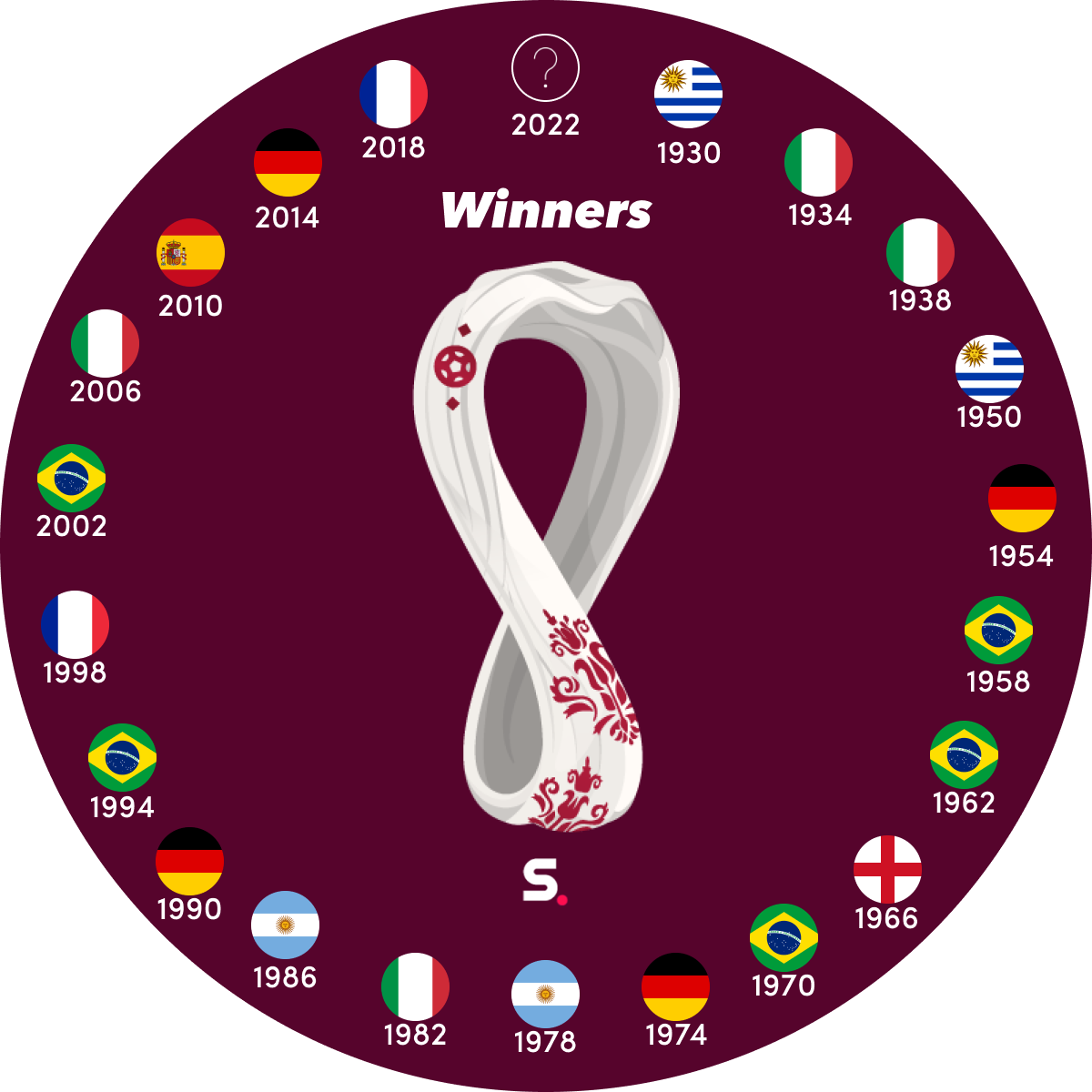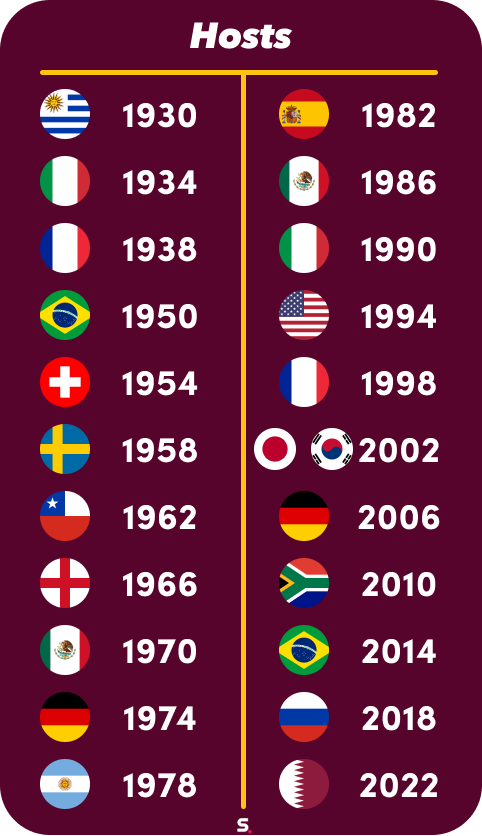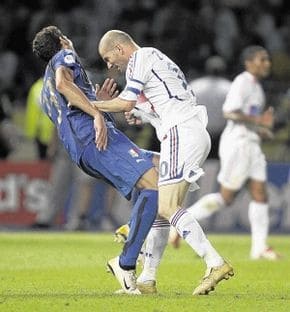World Cup History


The FIFA World Cup is an international football tournament contested by the men’s national football teams of the member states of the FIFA, the sport’s world governing body. Since the first tournament in 1930, the title has been awarded every four years, apart from 1942 and 1946 due to World War II. The World Cup Finals are the tournament’s final stage. The current format of the Finals involves thirty-two national teams competing over a month at venues within the host nation. Qualifying rounds are held during the three years preceding the Finals to decide which teams would play. Only eight countries have won the trophy. Brazil has won the World Cup five times, making them the most successful side in the tournament’s history. Italy and Germany are next with four championships each. The other past champions are Uruguay, who won the first tournament, Argentina, and France, each with two titles, and England and Spain, each with one. On this page, we’re going to learn more about the rich World Cup history.
Retrieve all historical World Cup data, dating back as far as 2006 with Sportmonks’ World Cup API. We offer reliable topscorers, standings, schedules, and more.
Football was born in 1862 when Englishman J.C. Thring wrote the first set of rules for what he dubbed ‘The Simplest Game.’ The basic game of football toured the world with the British. Football had already become a global sport by the conclusion of World War I. Jules Rimet and Henri Delaunay, two Frenchmen, proposed creating a World Cup every four years. Uruguay, who won Olympic gold medals in 1924 and 1928, volunteered to host the first event in 1930.
Qualifying tournaments have been held since the second World Cup in 1934 to narrow the field for the final tournament. These competitions take place in the six FIFA continental zones (Africa, Asia, North and Central America and the Caribbean, South America, Oceania, and Europe), that are controlled by their respective confederations. FIFA decides the number of spots awarded to each continental zone in advance for each tournament. Mainly based on the relative quality of the confederations’ teams, but subject to confederation lobbying.
The qualification procedure can begin nearly three years before the final competition and last for two years. Qualification tournament formats vary across confederations. Winners of intercontinental playoffs are usually given one or two spots. For example, the Oceania zone champion and the fifth-placed South American zone team competed in a play-off to determine which side would qualify for the 2006 World Cup. Since the 1938 World Cup, host countries have gained an automatic spot in the finals.
The World Cup was first televised in 1954 and has now become the most-watched and followed sporting event on the planet, surpassing even the Olympic Games. The total audience for the 2002 World Cup, including all matches, is expected to reach 28.8 billion. This tournament’s final match was seen by almost 1.1 billion people (a sixth of the entire population of the planet). The 2006 World Cup draw, which determined the pairing of teams, was seen by 300 million people.
Early World Cups were awarded to countries during FIFA congresses. Given the three-week boat travel between South America and Europe, the two football powerhouses, the choice of venue was very contentious. For example, the choice to stage the first World Cup in Uruguay resulted in just four European teams competing. The next two World Cups were staged in Europe. The choice to hold the second of them, the 1938 FIFA World Cup, in France was contentious, because the American countries had been led to believe that the World Cup would rotate between the two continents. As a result, Argentina and Uruguay both boycotted the event. The host country is now chosen in a vote by FIFA’s executive committee. This is accomplished by a single transferable vote method. FIFA sends the national football association of the country that wants to host the tournament a handbook called the “Hosting Agreement,” which describes the procedures and specifies the standards that must be satisfied to submit a strong bid. Following that, a FIFA-designated delegation of inspectors visits the nation to ensure that it fits the conditions for hosting the tournament, and a report on the country is created.

The Estadio Centenario in Montevideo, Uruguay, hosted the inaugural World Cup final in 1930. This stadium was built the country’s centennial. Although many teams were invited, only four from Europe made the long journey. The opening game was played on July 13 in Montevideo, between France and Mexico, with Frenchman Lucien Laurent scoring the tournament’s first goal. After an exciting tournament, thousands of Argentinians crossed the River Plate into Uruguay for the final game. But their side lost 4-2 to the host nation in front of 93,000 fans.
In 1934, the host of the first World Cup, Uruguay, did not make the trip. However, the US team made the long trip for only one game, falling 7-1 against the hosts. In the final Italy defeated Czechoslovakia 2-1 in extra time in front of Benito Mussolini and 55,000 spectators in Rome.
The qualifying rounds for the 1938 World Cup drew 32 teams, just 15 teams competed in the finals. And as in previous years the British teams remained absent. In the first round Germany was defeated by Switzerland, much to Hitler’s dismay. In the quarterfinal Italy faced off against France. To the annoyance of the French audience, Italian coach Vittorio Pozzo compelled his players to raise their arms in the Fascist salute during the walk on. In the semi finals Brazil fell to the reigning champion Italy. And to win their second title, Italy beat Hungary 4-2 in the final.
Following the tournament’s interruption due to World War II, this was the first World Cup in 12 years. For this World Cup in Rio de Janeiro, the Brazilians built the gigantic 175,000-seat Maracana Stadium, in what turned out to be a competition full of shocks. First, in one of the greatest upsets in World Cup history, a ragtag American team overcame England 1-0. Also Uruguay defeated Brazil 2-1 in the final in front of the home supporters in a crowded Maracana. This meant Uruguay won the World Cup trophy for the second time after a 12 year interruption from the World Cup. During this time an Italian football official stashed the trophy in a shoebox beneath his bed throughout the war.
The 1954 tournament was notable for the amazing amount of goals scored, 140 in only 26 games. Hungary was the favourite for this World Cup and beat West Germany 8-3 in the first round. After that Hungary defeated Brazil 4-2 in the quarterfinals with the game ending with a bench-clearing brawl. This encounter became known as the ‘Battle of Bern’. After beating Uruguay in the semi’s Hungary, led by the skilled but injured Ferenc Puskas, advanced to the final. In horrible conditions, West Germany defeated Hungary 3-2 in front of 60,000 fans at Bern’s Wankdorf Stadium.
The 1958 World Cup was the first to be shown on worldwide television. Because of this the whole world witnessed the development of a 17-year-old Brazilian named Edson Arantes do Nascimento, who would go down in history as Pele. He scored a total of six goals in the tournament. However, the competition’s true goal-scoring magician was the incredible French attacker Juste Fontaine, who scored 13 goals, a tournament record. Sweden proved to be a surprise in the tournament and made it all the way to the final. However, there they fell to a strong Brazil team led by Pele.
Chile had been ravaged by a series of earthquakes just two years prior to the 1962 World Cup. However, they still managed to construct two spectacular stadiums for the finals. In what was quite a shock, Pele was injured after just one game. But, luckily Brazil had a new hero in the form of small winger Garrincha, nicknamed “the little bird.” Brazil entered the tournament as favourite once again, and won its second championship with a 3-1 victory against Czechoslovakia.
The 1966 World Cup was hosted at the game’s birthplace, producing one of the best tournaments to date. The World Cup trophy was stolen before the event when it was on display in London. However, it was discovered eight days later by a dog named Pickles. The pre-tournament favourite, Brazil, was eliminated in the first round. Another favourite, Italy, was defeated 1-0 by an unknown North Korean team. However, the host country was the one to deliver. In England’s 4-2 victory over West Germany, Geoff Hurst scored the first and only hattrick in a final.
In 1969, a qualifying game for the 1970 World Cup, between Honduras and El Salvador sparked a battle known as the ‘Football War’. However, by the time the World Cup started, the nations had reached an agreement. The pre-tournament favourites were England after winning the previous World Cup. However they didn’t manage to live up to that expectation. However a strong Brazil side were very impressive during the tournament. Fielding one of the strongest teams in the event’s history, defeated Italy 4-1 in the final, with Pele scoring one goal. Brazil’s Jairzinho scored in each of his country’s games.
The 1974 tournament was overshadowed by a lack of good teams and a shortage of goals. The Netherlands and West Germany, on the other hand, had fantastic squads led by great players. The two faced off in the final, with the Netherlands being favourites. The Dutch had invented a style known as “total football,” in which players switched positions. With less than a minute played in the final game, the referee awarded the Dutch a penalty. The kick was converted by Johan Neeskens, and the Netherlands had taken the lead without a German player touching the ball. However, West Germany fought to level the game and eventually won on a penalty kick 2-1.
For the first time, more than 100 teams competed in qualifying rounds for the 1978 World Cup. The host nation, Argentina, was in political chaos controlled by a military dictatorship and faced terrorist assaults. But there was peace for the duration of the finals. The Dutch were favourites even with Johan Cruyff missing the tournament, but they still had a great team and advanced to the final game. Argentina needed four goals against Peru to win its second-round group and get to the final. They advanced at the cost of Brazil after scoring six goals. After 90 minutes, the final game between Holland and Argentina was tied 1-1. Argentina then sealed the deal by scoring twice in extra time to win 3-1.
For the 1982 World Cup the teams were increased from 16 to 24. The reigning champions, Argentina, gave birth to the legendary Diego Maradona, but his time had not yet come. West Germany suffered an early setback, falling 2-1 to Algeria and barely advancing to the next round. However, they bounced back and made it to the final were they faced Italy. Paolo Rossi scored the game-winning goal against West Germany in the final, bringing Italy to a 3-1 victory and their third championship.
The 1986 will be remembered as Diego Maradona’s World Cup. The Argentine midfielder with the famed left foot dominated the tournament with skill and controversy like no other player in the game’s history. His legendary “Hand of God” goal in the quarterfinals against England, in which he smashed the ball into the net with his hand, was seen by almost everyone except the referee. His second goal of the 2-1 game, despite being marked by many players and harshly fouled, was a stroke of genius. Argentina was through to the final. The other team in the final was West Germany after surviving a penalty shootout with Mexico. Argentina led the Germans 2-0 with 17 minutes remaining in the final match. However, Germany scored two goals in just 6 minutes to make the game all square again. Then Maradona struck, setting up Jorge Burruchaga perfectly to seal a 3-2 victory.
The 1990 World Cup was the tournament with the fewest goals, with only 115 scored in 52 games. The final was a repeat of the previous final. Germany faced off against Argentina. But, Maradona was a ghost of his former self. Germany avenged itself in the final, defeating Argentina 1-0 after a late penalty in a dull affair.
The 1994 World Cup was FIFA’s big missionary attempt, to expand the game in America’s sports-obsessed market. The United States was well prepared, with multiple venues available. The host Americans defeated outside favourite Colombia to get to the second round, but they were defeated by eventual champion Brazil in a Fourth of July encounter. The final was the first World Cup final game decided on penalty kicks, after Brazil and Italy failed to score in 90 minutes and overtime. Italy’s Roberto Baggio missed his penalty shoot, handing Brazil their fourth title and first since 1970.
The 16th FIFA World Cup was held in France from June 10 to July 12, 1998. FIFA picked the country to host the tournament for the second time in its history, defeating Morocco in the bidding process. The final between hosts France and winner Brazil drew 80,000 spectators to the spectacular Stade de France just outside Paris, but the controversy surrounding Brazilian star Ronaldo’s pre-game sickness dominated the early news. Ronaldo participated but struggled as French ace Zinedine Zidane controlled the game, scoring two goals as France won its first title 3-0.
For the first time, two countries hosted the World Cup in 2002. Japan was the early frontrunner to host, but a late and costly rise from South Korea prompted FIFA to allow both countries to host the tournament. The hosts, South Korea, emerged as the surprise squad, reaching the semifinals. However, Germany and Brazil played in the final game for the first time in the championship’s 72-year history. Germany was without crucial midfielder Michael Ballack, who was banned, and Brazil went on to defeat Germany 2-0 and win its sixth World Cup.

In the 2006 World Cup, Italy won their fourth championship by defeating France on penalties after the game was tied 1-1 after extra time. The last game will be remembered for French great Zinedine Zidane’s disastrous behaviour. Zidane, considered the tournament’s hero, took France an early lead with a cool penalty kick, but ten minutes into extra time, Zidane executed a head-butt on the chest of Italian Marco Materazzi, who had previously levelled the game 1-1. The referee then ordered the Frenchman off the field, ending one of the game’s great careers at his final World Cup.
From June 11 to July 11, 2010, South Africa hosted the 19th FIFA World Cup. The bidding procedure for hosting the tournament finals was exclusively open to African states; in 2004, FIFA chose South Africa over Egypt and Morocco to become the first African nation to host the finals. The matches were held in 10 venues around the country, with the final being at the Soccer City stadium in Johannesburg, South Africa’s largest city.
Second-ranked Spain began the 2010 World Cup by losing to Switzerland, but then went on to win every game after that, including a 1-0 triumph over Germany. Spain won the title with the fewest goals, scoring eight in its last four games. This meant that The Netherlands lost in the final for the third time. They were unbeaten throughout qualifying for the competition, and their loss in the finals ended their unbeaten record of 25 games. The Dutch now have the most victories in World Cup games without winning the tournament: 19.
Brazil hosted the 20th FIFA World Cup from June 12 to July 13, 2014, having been given the hosting rights in 2007. It was the competition’s second appearance in and the sixth in South America. A total of 64 matches were played at 12 venues spread among Brazil’s host cities. Spain, the defending champion, was eliminated in the group stage, along with England and Italy. Uruguay was knocked out in the round of 16, and France was knocked out in the quarter-finals. In the final, Germany defeated Argentina 1–0 in the final to win the tournament and capture the country’s fourth global trophy.

The 21st FIFA World Cup was held in Russia from June 14 to July 15, 2018. The finals included 32 teams. Twenty of the 32 had already competed in the 2014 World Cup, while Iceland and Panama made their World Cup debuts. 64 matches were contested across 11 cities in 12 different venues. The reigning champions, Germany, were eliminated in the group stage. On July 15, France faced Croatia in the final at Moscow’s Luzhniki Stadium. France won the World Cup for the second time, 4–2. The 2018 World Cup was also the first World Cup which included Video Assistant Referees, also known as VAR.
The 2022 FIFA World Cup is scheduled to be the 22nd running of the FIFA World Cup competition. This will be the first World Cup ever to be held in the Arab world. In addition, the tournament will be the last to involve 32 teams, with an increase to 48 teams scheduled for the 2026 tournament in the United States, Mexico, and Canada. Due to Qatar’s intense summer heat, this World Cup will be held from late-November to mid-December. The first match played at the tournament will be contested between Senegal and the Netherlands at Al Thumama Stadium, Doha. The final is due to be held on 18 December 2022, which is also Qatar National Day. The reigning World Cup champions are France. In May 2011, allegations of corruption within the FIFA senior officials raised questions over the legitimacy of the World Cup 2022 being held in Qatar. The accusations of corruption have been made relating to how Qatar won the right to host the event. Additionally, Qatar has faced strong criticism due to the treatment of foreign workers involved in preparation for the World Cup, with Amnesty International referring to “forced labour” and stating that hundreds or thousands of migrant workers have died as a result of human rights abuses, and careless and inhumane work conditions.

Are you interested in detailed data about previous World Cups? Then Sportmonks has got you covered. With our World Cup API you can retrieve all historical World Cup data, dating back as far as 2006. We offer reliable topscorers, group standings, schedules, match data. Do you want more information about the World Cup before getting access to our World Cup API? Visit our World Cup Guide, here you can find all there is to know about the World Cup in Qatar. Do you want to know how our API works? Visit our How-to build a World Cup Application blog.
Are you interested in more than the World Cup alone? Perfect, our Football API covers over 1,400 leagues!